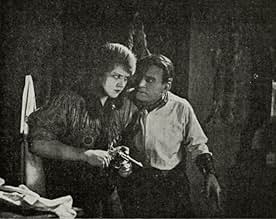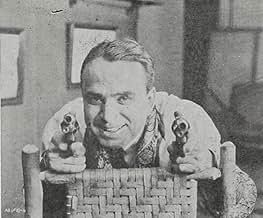The civilized inhabitants of a formerly "wild" western town scramble to recreate the town's rough and rowdy heyday in order to indulge the fantasies of a rich newcomer.The civilized inhabitants of a formerly "wild" western town scramble to recreate the town's rough and rowdy heyday in order to indulge the fantasies of a rich newcomer.The civilized inhabitants of a formerly "wild" western town scramble to recreate the town's rough and rowdy heyday in order to indulge the fantasies of a rich newcomer.
- Awards
- 1 win total
Sam De Grasse
- Steve Shelby - Indian Agent
- (as Sam de Grasse)
Monte Blue
- One of Wild Bill's Men
- (uncredited)
Walter Bytell
- Collis J. Hillington
- (uncredited)
Wharton James
- Lawyer
- (uncredited)
Bull Montana
- Bartender
- (uncredited)
Forrest Seabury
- Banker
- (uncredited)
Joseph Singleton
- Judson - Butler
- (uncredited)
Tom Wilson
- Casey - Engineer
- (uncredited)
- Director
- Writers
- All cast & crew
- Production, box office & more at IMDbPro
Storyline
Did you know
- ConnectionsEdited into Days of Thrills and Laughter (1961)
Featured review
This is one of the comedies Douglas Fairbanks made in his early, pre-swashbuckling days, and for the most part it's quite enjoyable. The premise is perfect for the sort of character Doug usually played at this point in his career: he's Jeff Hillington, son of a prosperous businessman, based in New York and shackled to a hated desk job, but restless with office routine, and obsessed with all things Western. Jeff reads cowboy adventure tales and believes every word of them: this is a guy who has set up an Old West campsite in his bedroom. He dresses like Tom Mix, calls everyone "Pard," rolls his own cigarettes and even lassos the butler, just to keep in practice. (My favorite touch is the six-shooter that serves as a door-knocker at the entrance to Jeff's room.) Some of his associates obviously consider Jeff a nut case, and with sufficient cause, but the famous Fairbanks charisma makes the character far more endearing than he would be in reality. When Jeff's father gets involved in a business deal with investors from the town of Bitter Creek, Arizona, it seems a perfect opportunity to send the boy out West, ostensibly to investigate the situation, but also to discover what life is really like out there. Jeff's father plainly hopes to rid the boy's system of this cowboy obsession once and for all. Instead, however, the Arizona investors decide to win over the unworldly son -- and thus influence his father -- by hoaxing Jeff with an elaborate show of Old West playacting, designed to indulge his delusion that Arizona is still the lawless frontier of his fantasies, where nothing has changed since the days of Billy the Kid.
It's essential to the plot that Jeff believes the Old West he's read so much about is absolutely genuine, and thus the premise raises a credibility problem: why hasn't this prosperous young man visited the West on his own by now? Clearly, viewers aren't supposed to ponder such questions, just as we must accept 35 year-old Douglas Fairbanks playing a young buck of 22 or so -- and not a mature 22, either, but a big kid who never grew up. We accept the premise because it's a clever idea. Certainly, the movie's most enjoyable scenes involve the efforts of Bitter Creek's citizenry to turn back the clock and transform their quiet village into the rootin' tootin' town Jeff expects, and they appear to be having a high old time in the process. Everyone dresses in cowboy gear while cars and other modern machines are hidden, and the hotel is transformed into a rude hostelry with saloon and dance floor. Blank cartridges are loaded into everyone's guns, and because Jeff accepts everything he sees as real the townsmen find it prudent to discreetly load his gun with blanks, too, so that no one gets hurt. Complications arise, however, when a villainous official decides to take advantage of the situation and pull off an actual train robbery, using the corrupt Indians under his command (whose guns are loaded with real ammo) to terrorize the town. Jeff attempts to save the day but finds that his guns are useless, and only learns the truth as Bitter Creek erupts into pandemonium. Ultimately, however, he manages to use his wits and energy -- and some real ammo -- to save the girl, the town, and the day, and prove himself a genuine Western hero.
Jeff Hillington is an ideal Douglas Fairbanks character: he's essentially a good guy, exuberant if naive, but he does learn a few valuable lessons along the way. While watching Fairbanks in this film I was reminded of the public persona of Teddy Roosevelt, an early 20th century President who was in a sense this country's last 19th century leader, a man who represented a frontier ethos that was quickly becoming a thing of the past in the 1910s. Indeed, Wild and Woolly, which was released a few months after the U.S. entered the Great War, is full of nostalgia for an America that was already slipping away fast. This tone is established in a brief prologue in which the covered wagons and stage coaches of yesteryear are contrasted with the trains and automobiles of the modern world. The early scenes in New York offer a view of the main concourse at Grand Central Station (only four years after it opened), as well as glimpses of the clothes, cars, furniture, and office equipment of 1917, but while the NYC Jeff Hillington inhabits looks impossibly quaint to our eyes, these trapping then represented the latest in fresh, sophisticated urbanity. Similarly, when we first see the "modern" town of Bitter Creek, Arizona, with Model-T Fords chugging down its wide dusty streets, to our 21st century eyes the place already looks primitive. It's only after the citizens make over the town as it was in "the Eighties" (i.e. the 1880s) that we see just how profoundly life in this country changed in a comparatively brief time.
Some viewers will be uncomfortable with scenes in the latter portion of the film, when evil Injuns go on a drunken rampage and deliver stereotypical dialog about "heap big pow-wows," etc. (Ironically, Fairbanks himself poked fun at such hokey depictions in his later comedy The Mollycoddle.) While a number of silent Western dramas were surprisingly sympathetic to Native Americans, that isn't the case here, and these scenes undercut the good humor of the film's first half. Still, there is much to enjoy in Wild and Woolly, especially for the historically minded viewer. (Then again, I suppose anyone interested in watching a silent comedy starring Douglas Fairbanks is by definition historically minded.) It's clever and generally amusing, and also offers something of an inside joke, as the satirical playacting can be viewed as a parody of some of the genuine Western adventure films being made at the time.
It's essential to the plot that Jeff believes the Old West he's read so much about is absolutely genuine, and thus the premise raises a credibility problem: why hasn't this prosperous young man visited the West on his own by now? Clearly, viewers aren't supposed to ponder such questions, just as we must accept 35 year-old Douglas Fairbanks playing a young buck of 22 or so -- and not a mature 22, either, but a big kid who never grew up. We accept the premise because it's a clever idea. Certainly, the movie's most enjoyable scenes involve the efforts of Bitter Creek's citizenry to turn back the clock and transform their quiet village into the rootin' tootin' town Jeff expects, and they appear to be having a high old time in the process. Everyone dresses in cowboy gear while cars and other modern machines are hidden, and the hotel is transformed into a rude hostelry with saloon and dance floor. Blank cartridges are loaded into everyone's guns, and because Jeff accepts everything he sees as real the townsmen find it prudent to discreetly load his gun with blanks, too, so that no one gets hurt. Complications arise, however, when a villainous official decides to take advantage of the situation and pull off an actual train robbery, using the corrupt Indians under his command (whose guns are loaded with real ammo) to terrorize the town. Jeff attempts to save the day but finds that his guns are useless, and only learns the truth as Bitter Creek erupts into pandemonium. Ultimately, however, he manages to use his wits and energy -- and some real ammo -- to save the girl, the town, and the day, and prove himself a genuine Western hero.
Jeff Hillington is an ideal Douglas Fairbanks character: he's essentially a good guy, exuberant if naive, but he does learn a few valuable lessons along the way. While watching Fairbanks in this film I was reminded of the public persona of Teddy Roosevelt, an early 20th century President who was in a sense this country's last 19th century leader, a man who represented a frontier ethos that was quickly becoming a thing of the past in the 1910s. Indeed, Wild and Woolly, which was released a few months after the U.S. entered the Great War, is full of nostalgia for an America that was already slipping away fast. This tone is established in a brief prologue in which the covered wagons and stage coaches of yesteryear are contrasted with the trains and automobiles of the modern world. The early scenes in New York offer a view of the main concourse at Grand Central Station (only four years after it opened), as well as glimpses of the clothes, cars, furniture, and office equipment of 1917, but while the NYC Jeff Hillington inhabits looks impossibly quaint to our eyes, these trapping then represented the latest in fresh, sophisticated urbanity. Similarly, when we first see the "modern" town of Bitter Creek, Arizona, with Model-T Fords chugging down its wide dusty streets, to our 21st century eyes the place already looks primitive. It's only after the citizens make over the town as it was in "the Eighties" (i.e. the 1880s) that we see just how profoundly life in this country changed in a comparatively brief time.
Some viewers will be uncomfortable with scenes in the latter portion of the film, when evil Injuns go on a drunken rampage and deliver stereotypical dialog about "heap big pow-wows," etc. (Ironically, Fairbanks himself poked fun at such hokey depictions in his later comedy The Mollycoddle.) While a number of silent Western dramas were surprisingly sympathetic to Native Americans, that isn't the case here, and these scenes undercut the good humor of the film's first half. Still, there is much to enjoy in Wild and Woolly, especially for the historically minded viewer. (Then again, I suppose anyone interested in watching a silent comedy starring Douglas Fairbanks is by definition historically minded.) It's clever and generally amusing, and also offers something of an inside joke, as the satirical playacting can be viewed as a parody of some of the genuine Western adventure films being made at the time.
Details
- Runtime1 hour 12 minutes
- Sound mix
- Aspect ratio
- 1.33 : 1
Contribute to this page
Suggest an edit or add missing content































